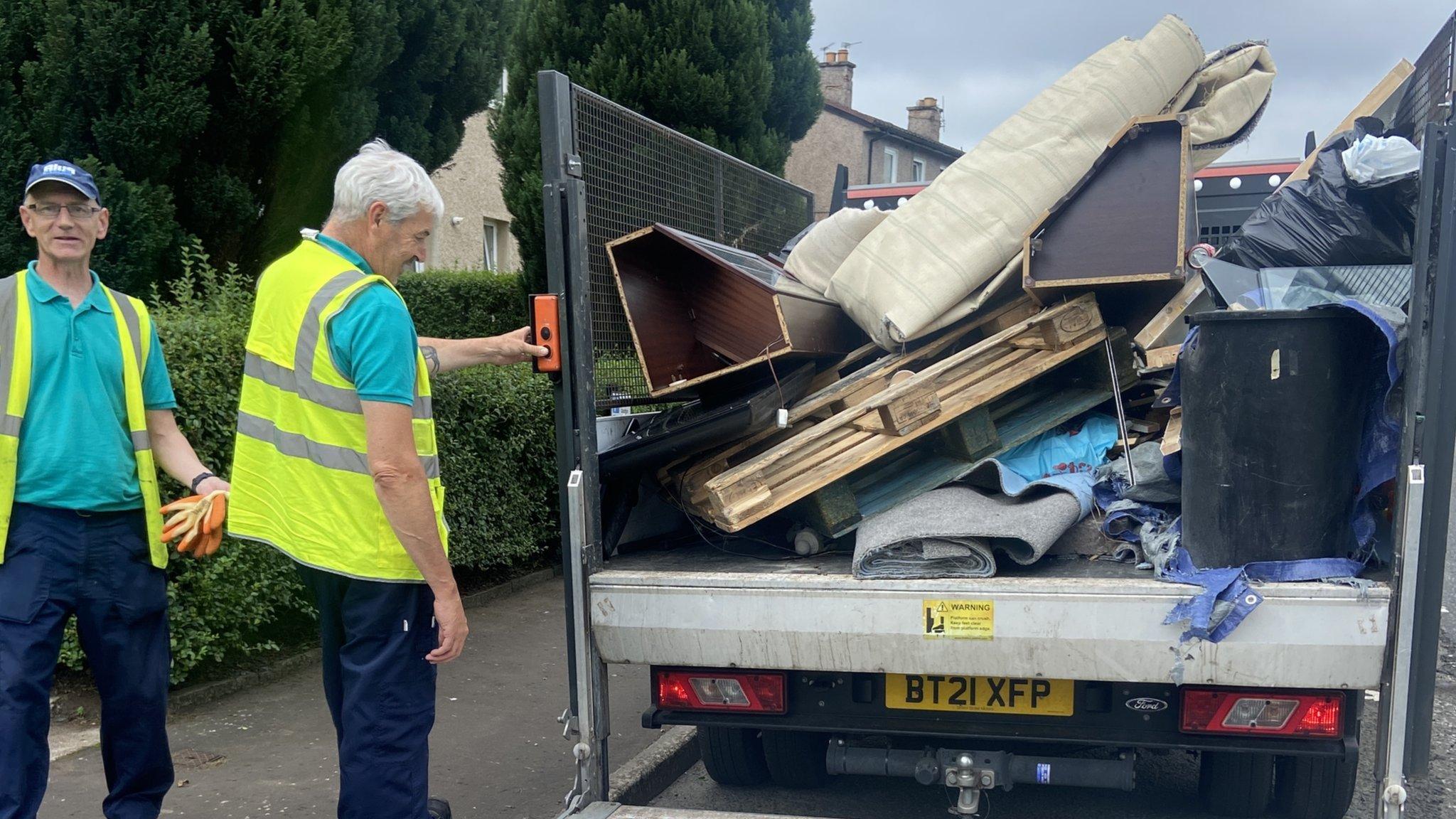School and bin workers accept council pay offer
- Published
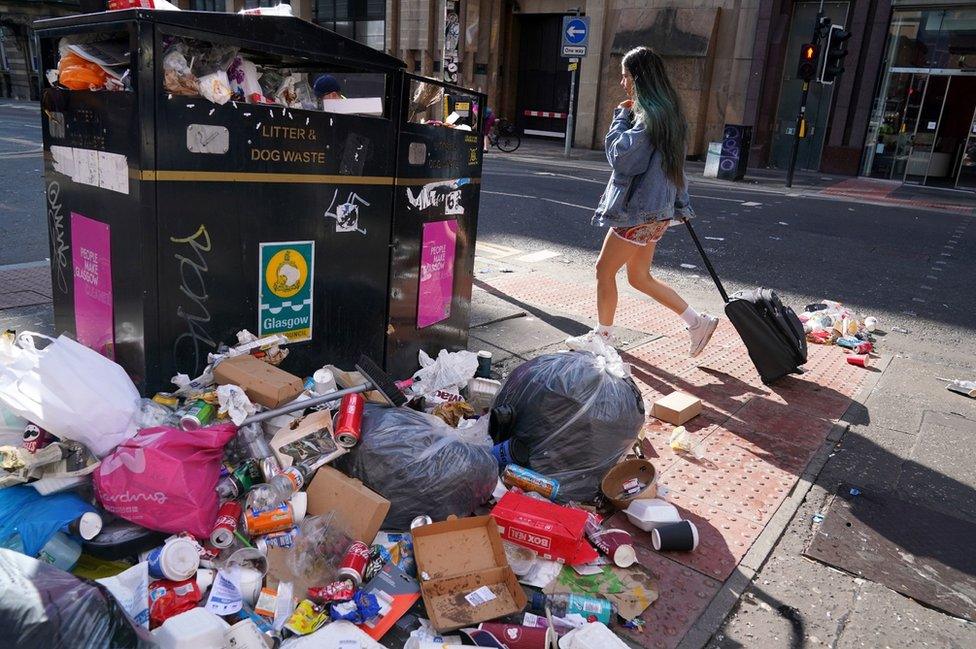
Refuse workers went on strike in many parts of Scotland over the summer
Council staff have accepted an improved pay offer following threats of strikes by bin and schools workers.
Unison and Unite said the majority of their members backed the deal giving all staff a rise of at least £1,900.
Strikes by refuse workers were held in August and further industrial action had been scheduled to close schools and leave bins unemptied this month.
The GMB union has already accepted the offer, which includes an extra day of annual leave.
The improved offer from Cosla - the councils' umbrella body - will give the lowest-paid staff a 10% pay rise instead of special cost of living payments this year and next.
Unison, Scotland's biggest union representing council workers, said two-thirds of members who voted backed the deal.
It balloted all of its local government members across Scotland and had a 64% turnout. The pay deal was accepted by 67% of those members.
Johanna Baxter, Unison Scotland's head of local government said: "Unison members have spoken and voted overwhelmingly to accept the improved pay offer and we will now press Cosla to get this money into members' pay packets as quickly as possible."
She said the improved pay offer was only made because "members took, and were prepared to take, industrial action".
"It was their collective strength that forced the Scottish government to accept they had a role to play and come up with more money, but it should never have got to that," she added.
More than half of Scotland's 250,000 council workers are thought to earn less than £25,000 a year for a 37-hour week.
Bin strikes began in Edinburgh on 18 August after unions rejected an initial pay offer equivalent to a 3.5% increase.
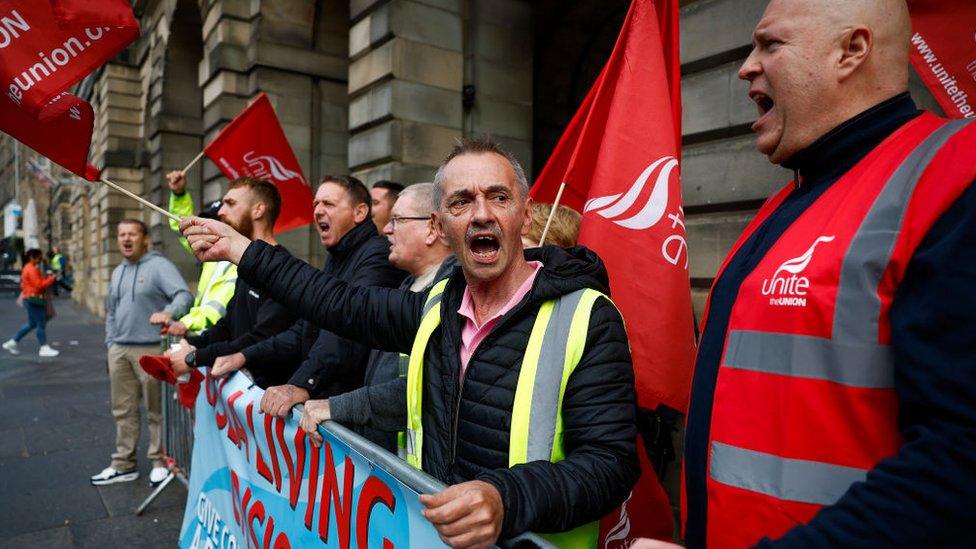
Refuse workers in Scotland had called for an offer to matcho their counterparts in England
The action escalated when workers at a further 20 local authorities walked out despite a revised 5% offer.
Cosla said at the time it was disappointed that the unions had turned down a deal that was at the "absolute extremes" of affordability, while First Minister Nicola Sturgeon warned there was no "bottomless pit" of money to pay for an improved offer.
Later strikes by refuse staff and schools and early years centres in 11 local authority areas were called off when the improved pay deal was put on the table.
A Unison spokesman said strike notices would be withdrawn once the union was satisfied that pay increases were properly included in salaries.
Deputy First Minister John Swinney said he was "very pleased" that the unions had accepted the "substantial" pay offer,
He said the Scottish government was giving councils an extra £140m "on a recurring basis to support the pay award".
"We are doing everything possible within the resources available to support the people of Scotland in the face of the cost of living crisis," he added.
A Cosla statement said the Scottish government would not need to intervene in pay disputes if local authorities had adequate and flexible funding.
Council services would be hit when local authorities need to make savings to find another £140m, it added.
Cllr Katie Hagmann, Cosla resources spokesperson, said: "The reduction of funding settlements and the introduction of one year budget cycles has severely restricted the ability of councils as employers to offer and agree meaningful pay deals that look to address the critical recruitment and retention issues faced across all levels of our workforce."

What is included in the new offer?
An increase of £2,000 for those earning up to £20,500
An increase of £1,925 for those earning between £20,500 to £39,000
A 5% increase for those earning between £39,000 to £60,000
A maximum increase of £3,000 for those earning above £60,000
The removal of social care registration fees
One extra day of annual leave
All increases will be based on a 36-hour week calculator

Unite, which had a 70% turnout for its ballot, said the pay increase would help workers "make ends meet during this cost of living crisis".
Sharon Graham, Unite general secretary, said: "Our members led from the front and throughout in this nationwide dispute, which started during the Edinburgh Fringe and then spread across Scotland.
"The package will deliver better jobs, terms and conditions for our members in local government and they should be congratulated for the brave stand they took."
However, the union has warned that it would not "tolerate" reductions in public services after the Scottish government said it had identified £500m in cuts as part of measures designed to fund the local government pay offer.
Wendy Dunsmore, Unite's lead negotiator for local government, added: "The robbing Peter to pay Paul narrative being spun by government ministers that decent pay rises only come with another service in the public sector being slashed is dangerous and it will be fought inch by inch by Unite."


The deal to settle the council pay dispute was reached by a tortuous path.
Unions hoped the mere threat of the rubbish piling up during the Edinburgh Festival would lead to a better pay offer and that strike action would be unnecessary.
Instead it took strike action in most of Scotland, the threat of action escalating and protracted negotiations.
But does the settlement offer a precedent for other parts of the public sector?
Unions want pay offers closer to the rate of inflation and are especially concerned for their lower paid members. Employers say they are sympathetic to the problems facing their staff but say any pay deal has to be affordable.
The deal to settle the council dispute was essentially a "flat cash offer" - basically most people will get exactly the same increase while those at the bottom will get a little more on top.
The argument is that this is fairer than offering a pay rise which is a percentage of someone's salary. The greatest relative benefit is to the lowest paid.
Teachers, NHS staff and some Scotrail workers are also looking for better pay offers. If the total cost of the pay deal cannot go up, would "flat cash offers" be fairer? Or would workers be keen to maintain the differentials in pay which take account of seniority and experience?
- Published2 September 2022
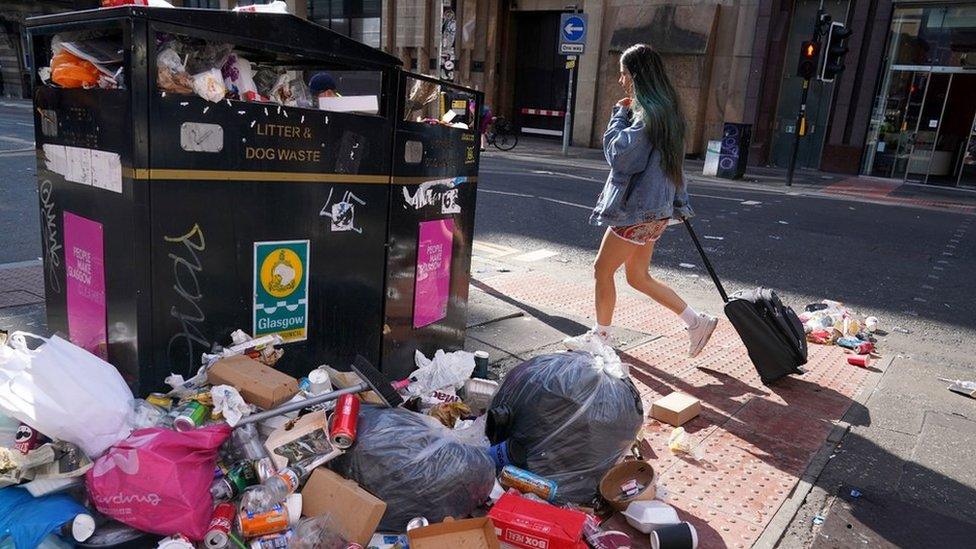
- Published30 August 2022
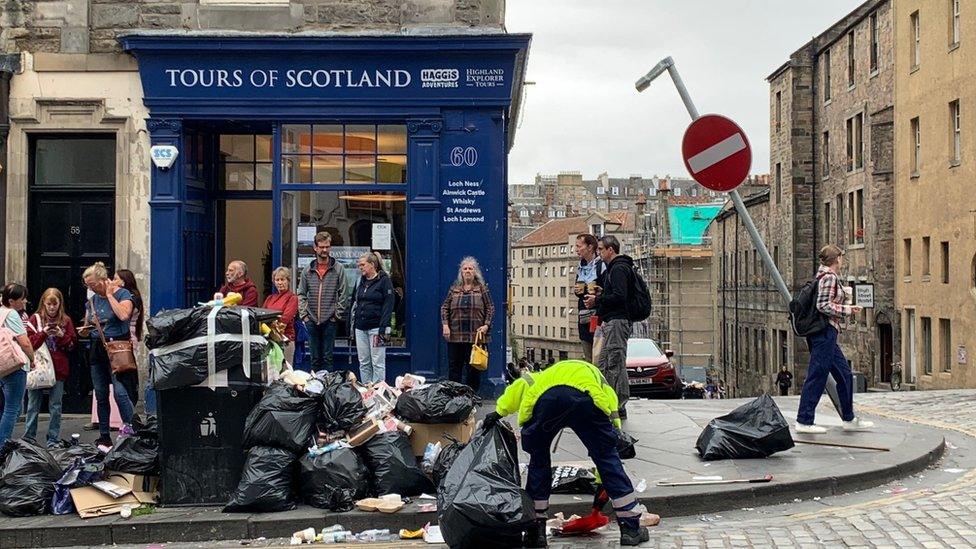
- Published1 August 2023

- Published31 August 2022
